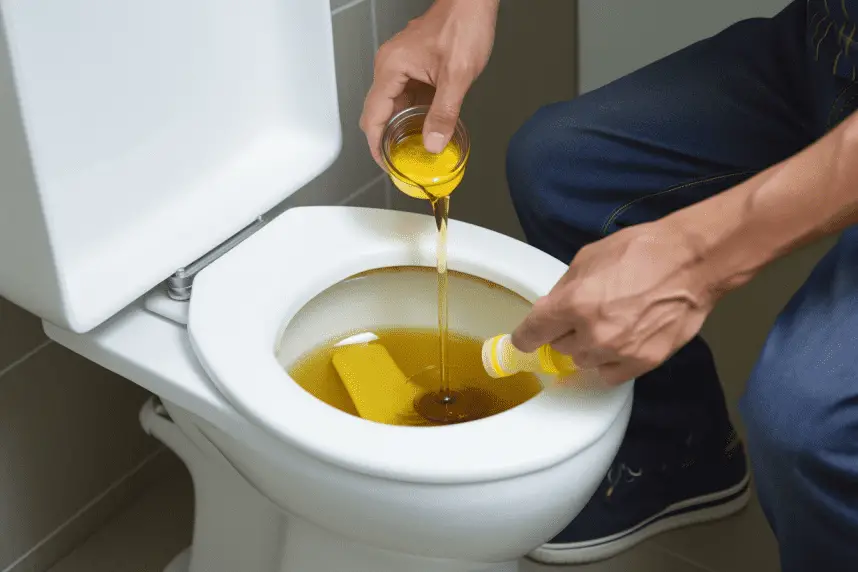In this blog post, we will explore the common question of whether you can flush oil down the toilet. Maintaining a healthy plumbing system is crucial for every household, and understanding the proper way to dispose of various substances plays an important role in that.
Our focus will be on cooking and frying oil, which is common in most kitchens.
We will dive into the possible consequences of flushing oil down the toilet and explore environmentally friendly alternatives for proper disposal.
So, can you flush oil down the toilet? The answer is no; it is not safe or recommended to flush oil down the toilet due to its negative impact on the plumbing system and the environment.

Can You Flush Oil Down the Toilet?
As previously mentioned, flushing oil down the toilet is not advisable. When we understand the reasons behind this, it becomes clear that disposing of oil this way can negatively affect the environment and our household plumbing systems.
Oil flushed down the toilet can solidify within the pipes, gradually accumulating and eventually contributing to pipe blockages. These blockages may cause sewage backups, which can be incredibly unpleasant and expensive. Furthermore, disposing of oil through the toilet may overwhelm water treatment facilities and potentially harm local ecosystems.
Given these potential consequences, seeking alternatives to flushing oil down the toilet is essential. Consider environmentally friendly options, such as storing used cooking oil for recycling or converting it into biodiesel or other usable products.
This not only protects your plumbing system and the environment, but it also promotes responsible waste management practices.
Can Oil Clog A Toilet?
The possibility of oils clogging a toilet is an important consideration before deciding to flush it down. Oils can cause various issues within the plumbing system, as shown in the table below:
| Issue | Explanation | Example |
|---|---|---|
| Pipe blockages | Oils solidify and accumulate, leading to blockages in the pipes | Grease buildup |
| Sewage backups | Oil accumulation can clog main sewer lines, causing sewage backups | Overflowing toilets |
| System strain | Oils cause added strain on septic tanks and water treatment plants | Overloaded facilities |
Oils can cause significant problems within the plumbing system and the environment. Therefore, it is essential to dispose of them responsibly and avoid flushing them down the toilet.
How Do I Dispose of Cooking Oil?
Disposing cooking oil correctly is essential to reduce the impact on your plumbing system and the environment. The following step-by-step guide outlines how to dispose of cooking oil responsibly:
Step 1: Cool the Oil
Allow the used cooking oil to cool completely. Pouring hot oil into a container may cause it to crack or leak, creating unnecessary mess and hazards.
Step 2: Choose a Suitable Container
Find a sealable, non-breakable container, preferably one that has a screw-top lid. Empty plastic milk jugs, juice containers, or other food-safe plastic containers work well. Avoid glass containers, as they can crack or shatter.
Step 3: Pour the Oil into the Container
Carefully pour the cooled cooking oil into your chosen container using a funnel. Ensure the container is clean and dry before pouring the oil to prevent bacterial growth and odors.
Step 4: Seal the Container
Securely seal the container by tightly closing the lid. It is crucial to prevent leaks and spills during storage and transport.
Step 5: Store Until Full
Store the oil-filled container in a cool, dry place away from direct sunlight. Add more used oil to the container whenever you have some until it is full.
Step 6: Locate a Recycling Facility
When your container is full, research local recycling or disposal facilities that accept cooking oil. Many communities have designated recycling centers or waste disposal programs that accept used oil.
Step 7: Transport and Dispose
Take your sealed container of used cooking oil to the designated recycling or disposal facility. Do not dump it illegally, which can lead to water and soil pollution.
Can Cooking Oil Unclog Toilet?

While you might come across claims that cooking oil can be used to unclog a toilet, it’s essential to approach this method cautiously. In general, adding oils to your plumbing system is not advisable. Oils can solidify in the pipes and contribute to blockages, leading to the same issues you’re trying to resolve.
Instead of relying on cooking oil to unclog your toilet, consider more effective, eco-friendly alternatives. These methods include using a plunger or a toilet auger specifically designed to remove blockages in toilets.
You can also try using a combination of hot water, baking soda, and vinegar, which can break down the clog without the potential risks associated with introducing oil into your plumbing system.
So, it’s best to avoid using cooking oil to unclog a toilet due to the potential for worsening blockages and causing further damage to your plumbing system. Stick to tried-and-true methods, like plungers and environmentally friendly cleaning solutions, to keep your toilet and pipes functioning at their best.
What Happens If I Pour Oil Down The Toilet?
Pouring oil down the toilet can have numerous adverse consequences for the environment and your home’s plumbing system. Here are a few significant problems that can result from this action:
1. Pipe Blockages: As oil solidifies, it creates blockages within the pipes, which can lead to major plumbing issues.
2. Sewage Backups: Accumulated oil in the plumbing system can cause sewage backups, damaging your home and creating a health hazard.
3. Strain on Water Treatment Facilities: Flushing oil down the toilet places additional strain on water treatment facilities, affecting their efficiency and capacity to treat waste.
4. Polluted Waterways: When oil reaches waterways, it can create a film on the water surface, inhibiting oxygen exchange and causing harm to aquatic life.
5. Soil Contamination: Improper oil disposal can contaminate soil, affecting plant growth and seeping into groundwater.
Additional Tips for Proper Oil Disposal
Here are some tips for disposing of oil in a more environmentally safe way:
Reusing Cooking Oil:
Consider reusing cooking oil, especially if it has not been burned or contaminated. This saves money and reduces the amount of oil waste you generate.
- Strain the oil to remove food particles and impurities
- Store it in a clean, airtight container for future use
- Monitor the oil’s smell and appearance to ensure its quality
Repurposing Cooking Oil:
Used cooking oil can be repurposed for various other uses, such as making soap, candles, or bird feeders.
Donating Cooking Oil:
Some local farms accept used cooking oil donations for use as an animal feed supplement or for conversion into biodiesel. Research farms in your area to see if they accept used oil donations.
Creating Cooking Oil Compost:
Small amounts of used cooking oil can be added to compost as long as it is free of meat particles and other contaminants. However, practice moderation, as excessive oil can make the compost pile unbalanced and smell bad.
By following these additional tips, you can ensure that your cooking oil is disposed of responsibly, minimizing the negative impact on your plumbing system and the environment. It is essential to be diligent and consistent in your oil disposal practices to ensure your household’s and the planet’s well-being.
Conclusion
In conclusion, it is crucial to understand that the answer to “can you flush oil down the toilet?” is a resounding no. Flushing oil down the toilet has numerous negative consequences for both your home’s plumbing system and the environment.
To avoid pipe blockages, sewage backups, the strain on water treatment facilities, and harm to aquatic life and soil, it is essential to dispose of oil in a responsible and eco-friendly manner.
By following the guidelines and tips provided throughout this article, including properly disposing of cooking oil in a designated recycling facility, reusing or repurposing oil, and exploring various environmentally responsible alternatives, you can minimize the impact of your oil disposal practices.
By being informed and proactive in our approach to waste management, we can contribute to a more sustainable future and protect our households and the planet.
